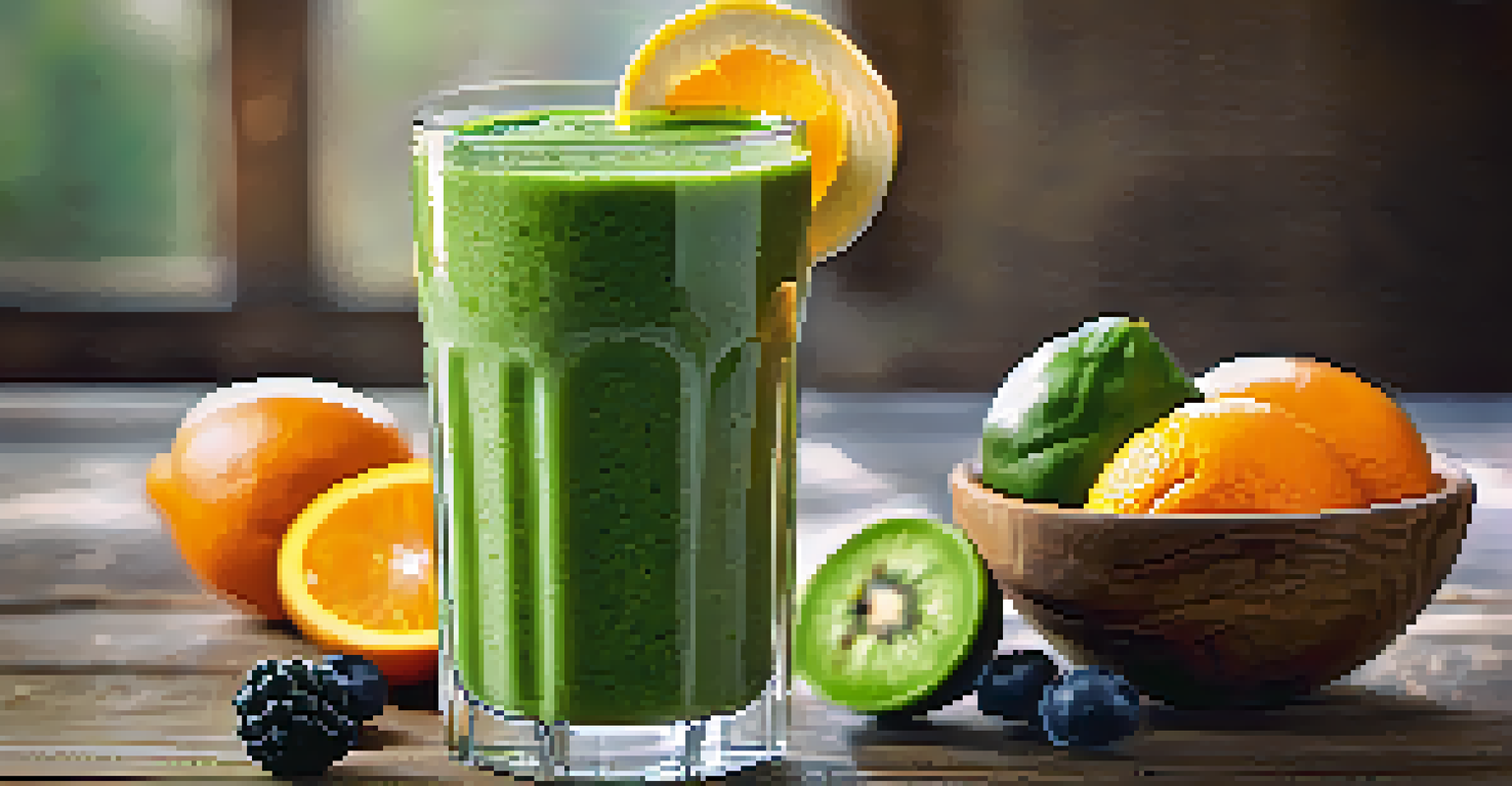Nutritional Benefits of Raw Foods for Optimal Brain Health

Understanding Raw Foods and Brain Health
Raw foods are those that haven’t been cooked or processed, retaining their natural nutrients. This category includes fresh fruits, vegetables, nuts, and seeds, all of which are packed with essential vitamins and minerals. When it comes to brain health, these nutrients play a critical role in maintaining cognitive function and enhancing memory.
Let food be thy medicine and medicine be thy food.
The brain requires a variety of nutrients to operate optimally, and raw foods provide an abundant source. For instance, leafy greens like spinach and kale are rich in antioxidants, which help protect brain cells from oxidative stress. This protective effect is vital as oxidative stress is linked to cognitive decline and neurodegenerative diseases.
Incorporating raw foods into your diet can be as simple as adding a side salad to your meals or snacking on raw nuts. By making these small changes, you can nourish your brain and support overall cognitive health without feeling overwhelmed. Embracing raw foods can be a delicious and effective way to enhance mental clarity.
Antioxidants: The Brain's Best Friend
Antioxidants are compounds that help combat free radicals in the body, which can damage cells and contribute to aging. Raw foods, especially fruits like berries and vegetables like broccoli, are rich in antioxidants. These powerful nutrients not only protect brain cells but also improve blood flow to the brain, enhancing overall brain function.

For example, blueberries are often referred to as a superfood due to their high antioxidant content. Studies suggest that regular consumption of blueberries can improve memory and cognitive performance. By integrating these vibrant fruits into your diet, you can offer your brain a tasty boost.
Raw Foods Boost Brain Health
Incorporating raw foods like fruits and vegetables provides essential nutrients that support cognitive function and memory.
Incorporating a rainbow of raw foods into your meals ensures a diverse intake of antioxidants. Think of your plate as an artist's palette, where each color represents different nutrients that contribute to brain health. The more colors, the more benefits you gain!
Healthy Fats: Fueling Cognitive Function
Not all fats are created equal, and healthy fats are essential for optimal brain function. Raw foods such as avocados, nuts, and seeds are rich in omega-3 and omega-6 fatty acids, which are crucial for maintaining nerve function and promoting brain health. These fats help build the brain's structure and improve communication between brain cells.
The brain is like a muscle. When it is in use, we feel very good. It is like the feeling of lifting a 50-pound block and then you feel the sensation of the muscle working.
For instance, walnuts are often touted as a brain food due to their high omega-3 content. Including a handful of walnuts in your daily routine can significantly benefit your cognitive abilities. They’re not only nutritious but also a satisfying snack.
When choosing raw foods, focus on incorporating sources of healthy fats. Whether it’s a drizzle of olive oil on your salad or a smoothie with avocado, these fats support your brain while keeping you feeling full and satisfied. It’s a win-win for both your taste buds and your cognitive function!
Vitamins and Minerals: Essential Nutrients for the Brain
Vitamins and minerals are fundamental for maintaining brain health and function. Raw foods are a rich source of key vitamins, such as B vitamins, vitamin C, and vitamin E, all of which play a role in brain health. B vitamins, for example, are crucial for energy production and neurotransmitter synthesis, directly impacting mood and cognitive abilities.
Dark leafy greens, citrus fruits, and nuts are excellent sources of these vitamins. Including a variety of these foods in your diet can help stave off deficiencies that may lead to cognitive decline. Think of it as giving your brain the tools it needs to work effectively.
Antioxidants Protect Brain Cells
Antioxidants found in raw foods, such as berries and leafy greens, help combat oxidative stress and improve blood flow to the brain.
To maximize your vitamin intake, consider a raw food smoothie packed with spinach, banana, and a splash of orange juice. This not only tastes great but also delivers a powerhouse of nutrients that support cognitive function. Your brain will thank you for it!
Hydration: A Key Component of Brain Health
Staying hydrated is often overlooked, but it’s crucial for maintaining optimal brain function. The brain is composed of approximately 75% water, and dehydration can lead to difficulties in concentration and cognition. Raw foods, particularly fruits and vegetables, have a high water content, making them an excellent choice for hydration.
For instance, cucumbers and watermelon are not only refreshing but also help replenish your body’s water levels. Eating these hydrating foods can keep your brain sharp and focused throughout the day. It’s like giving your brain a refreshing drink with every bite!
Incorporating hydrating raw foods into your meals can be as simple as adding slices of cucumber to your sandwiches or snacking on juicy fruits. This way, you can boost your hydration levels while enjoying delicious flavors. Remember, hydration is a vital part of your brain health journey!
The Role of Fiber in Brain Health
Fiber is often associated with digestive health, but it also plays a significant role in brain health. Raw foods, such as fruits, vegetables, and whole grains, are excellent sources of dietary fiber. This fiber helps regulate blood sugar levels, ensuring a steady supply of energy to the brain.
For example, apples and pears are not only tasty snacks but also rich in fiber. Eating these fruits can help prevent energy crashes that may affect your focus and cognitive abilities. A steady energy supply is crucial for sustained brain performance.
Healthy Fats Fuel Cognitive Function
Raw foods rich in healthy fats, like avocados and nuts, are crucial for maintaining nerve function and enhancing communication between brain cells.
Including fiber-rich raw foods in your diet is an easy way to support brain function. Consider topping your breakfast with fresh berries or adding raw veggies to your lunch. By doing so, you’re not only boosting your fiber intake but also fueling your brain for optimal performance.
Creating Balanced Raw Meals for Brain Health
To reap the full benefits of raw foods for brain health, it’s essential to create balanced meals. A well-rounded meal includes a variety of raw fruits, vegetables, healthy fats, and protein sources. This combination ensures you receive a diverse array of nutrients that support brain function and overall health.
For instance, a raw salad with mixed greens, avocado, cherry tomatoes, nuts, and a sprinkle of seeds offers a nutrient-dense meal that keeps you energized. You can experiment with different combinations to discover what works best for your taste buds and nutritional needs.

By planning balanced raw meals, you can make healthy eating enjoyable and satisfying. It’s all about finding the right mix that fuels your brain while tantalizing your palate. With a little creativity, you can turn raw foods into delicious brain-boosting meals!